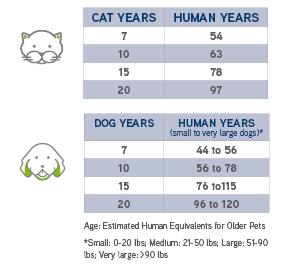We love our pets, and thanks to advancements in animal care, they’re living longer now than ever before. As our furry friends get older, their needs change and more care must be taken to ensure they live the rest of their years as happily as possible.
Because we love dogs of all ages, we wanted to answer a few of the common questions that surround senior pets. These questions resonated with us, and we did our research to answer them for you.
When is a Pet Considered “Old”?
We all would have a different answer to this question. The answer really depends on the size and type of pet. Cats and dogs, for example, are categorically aged differently, as are large and

small dogs. This chart from the American Veterinary Medical Foundation shows the estimated human age equivalent for older pets. (Source)
According to the AVMA, cats and dogs are considered “senior” at seven years of age. As mentioned before, larger breeds of dog tend to have shorter life spans; they’re considered to be
“senior” at the age of five or six years.
Dog vs. Human Age Comparison
We’ve all heard the formula to calculate the age of a dog in human years, “Dog age in years x seven = Human Age in years”. Contrary to the saying, this is not accurate. As mentioned before, breed and size play a role in the human age equivalent of your dog’s age.
Common Problems Seen in Senior Pets
One of the easiest signs of aging in a pet can be graying haircoat, but it is also important to remember that your pet’s internal organ system is changing too. Accurately, older pets are more likely to develop heart disease, kidney or liver disease, cancer, or arthritis. Loss of sight and hearing are also common in pets, just as they are in humans.
These bodily or organ changes are often coupled with behavioral changes, such as disorientation, increased wandering, changes in when your pet sleeps, accidents in the house, less interest in playing, low energy, and anxiety or nervousness.
Weight in Senior Pets
Obesity and weight trouble in older pets can have an even larger effect on their health. High weight increases the risk of arthritis, difficulty breathing, diabetes, high blood pressure, skin problems, cancer and other ailments. If your senior pet is experiencing weight-related symptoms, or if you’re concerned they may be overweight, visit your vet so they can properly assess the situation. Most often they will recommend a change in diet, or even a special food blend to help with weight management.
Sudden weight loss in a senior pet is also a cause for concern, particularly in felines. An overactive thyroid gland, or hyperthyroidism, diabetes, and kidney disease are common causes of sudden weight loss in senior cats. If you see sudden weight loss in your pet, contact your vet.
For more information about senior pets and senior pet care, check out the Senior Pet Care (FAQ) from the AVMA.
Have a senior pet? We love meeting and photographing dogs of all ages! Portraits are for every season of your dogs’ life – not just puppies! Call or text Jennifer at 602-689-7261, or complete our form to request more information about a senior pet portrait session.
